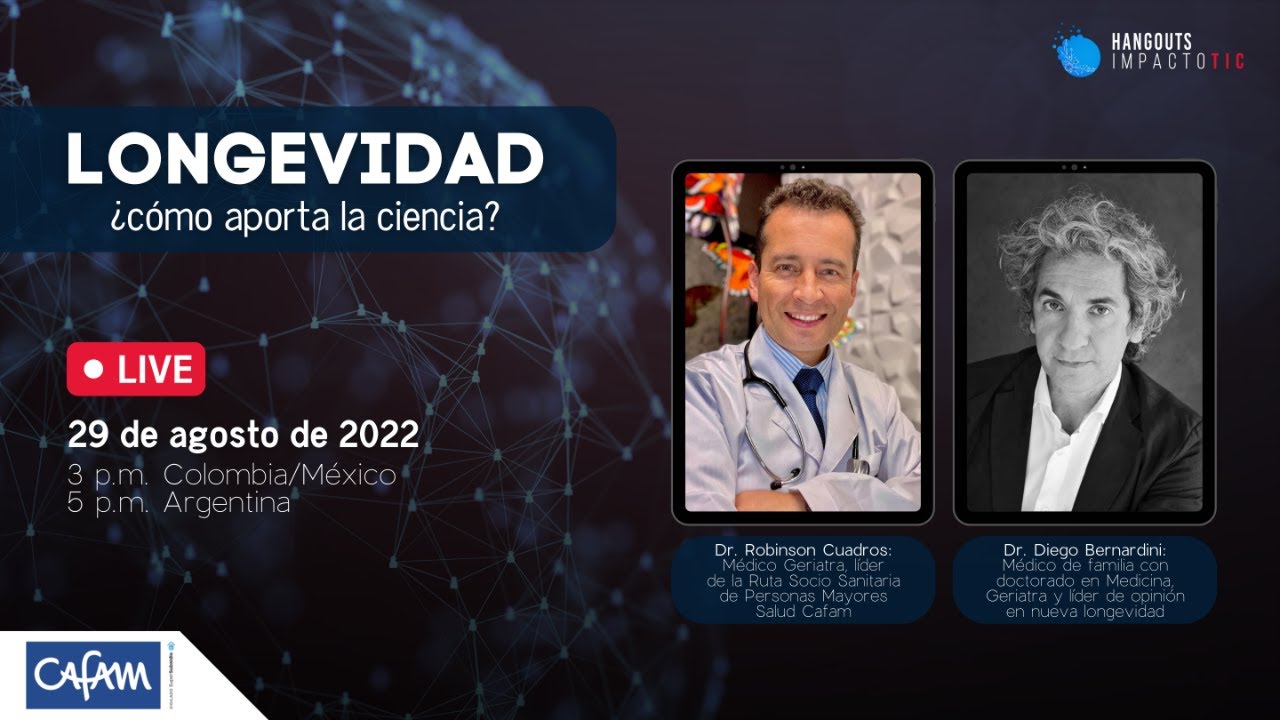According to the Dane, More than 20,000 people are over 100 years old in Colombia, and life expectancy in the country is already almost 77 years on average. How does science contribute? What are the main changes that have occurred? How do we adapt to this new reality?
On August 28 in Colombia the day of the elderly is celebrated, and to commemorate this day the central theme of the hang out organized by Impacto TIC and Cafam, was longevity. Doctors participated in the talk. Diego BernardinoMD, and public opinion leader in new longevity and older people and Robinson Picturesdoctor and surgeon, specialist in geriatrics and leader of the socio-sanitary route for the Elderly in Salud Cafam.
We speak with Dr. @Diego__MD and dr. @picturesrobinson about Longevity, how does science contribute? #CharlasCafam @CafamOficials
Join here >> pic.twitter.com/4J98GFWXGr
— ICT Impact (@ImpactoTIC) August 29, 2022
The blue zones of longevity
Scientific research has shown that in various parts of the world people live longer, and that they can exceed 100 years. The common factor focuses on good health and an active life.
“Today much of that decision-making in health is based not only on experience but also on evidence, that evidence shows us that there are certain behaviors or lifestyles that are clearly related to longevity”,
dr Diego Bernardino.
And it mentions 5 patterns of longevity that are related to factors such as: physical activity, good nutrition, spirituality, emotional ties and having a life plan. From there it follows the concept of the new longevity and the so-called blue zonesplaces where people exceed the centenary of age.
In Colombia there is still no clear map of these blue zones, but according to Dr. Robinson Cuadros, it has been shown that in the country a child born today in stratum 3 has a life expectancy of 104 or 105 years.
“These blue zones are located in Greece, Italy, California. The closest is located in Costa Rica, which has a concentration of older people. In Colombia we have areas where there is a higher life expectancy than the rest of the country, they are concentrated in the Coffee Region. In these areas for every young person under 15 there are almost 2 people over 60”points out Dr. Cuadros.
The new longevity as a lifestyle
The concept of new longevity focuses on looking not only at demographic or quantitative value, but also at relating to a new way of living. Namely, these people are not limited by a chronological age.
“We have to think that this new longevity does not mean living longer but living differently, therefore having opportunities, having plans, projects that perhaps at another time in life they could not carry out.”, points out Dr. Bernardino, who has expanded his experience in the concept of new longevity.
For him, this reality is reflected in phenomena that have to do with aspects such as: quantity, there are more older people; intensity, they are older people who live differently; new roles are being linked to roles such as politics; prejudices, a transformation in which to speak of longevity is to speak of opportunities.
Along the same lines, Dr. Cuadros adds that this is a moment in history when for the first time you can think of living longer in a healthy and stable way. This opens the possibility that each person can plan the way he wants to age and plan a lifestyle for her old age.
For the 2 experts, old age goes beyond biological age. Scientific studies have shown that longevity has changed in its concept, which is accompanied by qualitative aspects such as quality of life, attitude towards age, spirituality, perspective on life. In the end, these are a push for people to live longer.
“To the extent that I understand these biological and physiological processes of aging, I discover that I can still continue to be sexually active, that I can continue to be productive, generating knowledge, contributing to society”,
Dr Robinson Pictures.
–
If you missed this Hangout, you can see it in its entirety on the ImpactoTIC Youtube channel

